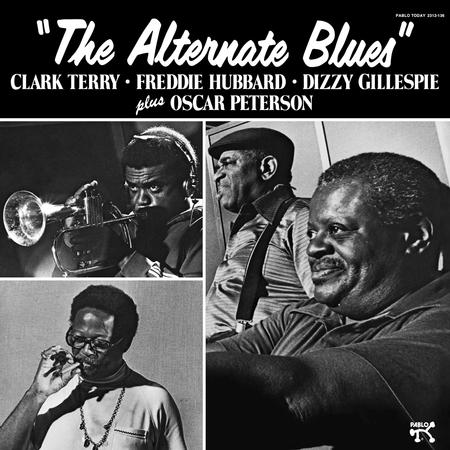First Analogue Productions Pablo Reissue Is a Series of "Trumpet Summit" Outtakes
you won't wonder why this one's first when you hear it
When Norman Granz organized and produced in 1980 The Trumpet Summit Meets The Oscar Peterson Big 4 (Pablo 2312-114), Peterson was fifty five years old, Ray Brown was fifty two, Bobby Durham was forty three, Joe Pass was fifty one, Dizzy Gillespie was the "elder statesman" at sixty three and Freddie Hubbard was the youngster at forty two. By today's age standards none of them were "old", but jazz at that point—at least the kind of jazz these guys made—had fallen out of favor, especially in The United States and major record label executives had little interest in either the music or the musicians.
Fortunately Norman Granz, who had founded Clef, Norgran and Verve, did. He recorded these guys and so many others late in their careers and lives. Other than Clark Terry, who later in life made a pretty good living playing trumpet for Johnny Carson's Tonight Show band and lived to be ninety four, the others died relatively young by today's longevity standards. Dizzy passed in 1993 at seventy five, Peterson in 2007 at eighty two, Brown at seventy five in 2002, Pass at sixty five in 1994, Durham at seventy one in 2008 and Hubbard at seventy in 2008.
We are lucky to have documents like the original Trumpet Summit and this one, released two years later in 1982 and not because Granz was short of material to release or was trying to financially feast on scraps. Instead, as he explains in the liner notes, he felt there was a sufficient number of blues enthusiasts who would greatly appreciate even the four unfinished takes presented here.
These are, as Granz explains, slow blues numbers, or what used to called by the dances at the Savoy "Slow Drag", with each trumpet segment introduced by a different member of the rhythm section. Granz explains that Gillespie and Hubbard settled on an eight bar blues structure but Clark Terry was tied to twelve bar blues so for multiple takes the two forget they were supposed to shift from eight to twelve, which threw off the rhythm section and the takes had to be abandoned. Here you get to hear those earlier takes and what happened as they broke down. It's not painful as these studio and stage-tested veterans break out in laughter.
And as Granz also explains, these guys can do anything with their horns so each take of the basic blues structure, which taken slow sounds much like a burlesque strip-tease soundtrack, is completely different and packed with intricate, virtuosic and often playful blowing by the trio of greats.
Following the alternate takes in which the usually ornate and forward Peterson lays back allowing the horns to dominate is a more straight forward ballad medley of "Here's That Rainy Day", "Gypsy" and "If I Should Lose You."
In an email just the other day a writer for this site asked me for a definition of "swinging". i didn't think of it but i should have told him to get this record and listen to this medley. It swings!
As for the sound here? Demo disc quality IMO for timbral accuracy, sound staging, dynamics, you name it but especially for how the trumpets were recorded and how each horn players' distinct tonal and textural personality is so well captured. The closer, "If I Should Lose You" might be the set's highlight, though it's hardly the showiest piece and there are no low lights. Its melancholic nature reminds us that they are all gone now, and that Gillespie, whose solos on the track stand out, passed away a short thirteen years after this was recorded.
Jazz fans are of course indebted to Norman Granz for all that he did for jazz and for racial justice as well in his life, but there's something very special about this Granz career capper Pablo series that celebrates these jazz "elder statesmen" (though of course most of them played for decades more). The label, which Granz founded the in 1972, was sold to Fantasy fifteen years later. It's taken many decades since for Pablo to be recognized and appreciated. Time only adds to its luster.
Even though it's an outtakes record, The Alternate Blues is a worthy example of what Granz documented when he was also in his early sixties (he passed on in 2001 at eighty three)—capturing to tape veterans still playing in their primes at a time when the then current music scene had moved on.
This Analogue Productions series as well as the Verve series serve as both tributes to Granz's vision and as sources of, in the case of Verve, some of the greatest jazz albums ever produced, and with Pablo as superb sounding documents of still vital later in life jazz artists having a blast in the studio and on stage. Time only increases their luster.
BTW: This and Fitzgerald and Pass Again (mastered by Stan Ricker) of the new Pablo series were previously released as early as 1996 as part of the Analogue Productions "Revival Series" back when only a small number of diehards like Chad Kassem were re-issuing vinyl records and an equal number of consumers were buying and playing them! That was almost thirty years ago and here they are again for another generation or two to enjoy. Some of the others had also been previously reissued at 33 1/3 and 45rpm by Analogue Productions but all of the rest have been freshly recut by the best mastering engineers, whose names you know.
Was this too morbid a review? I hope not!










































.png)








